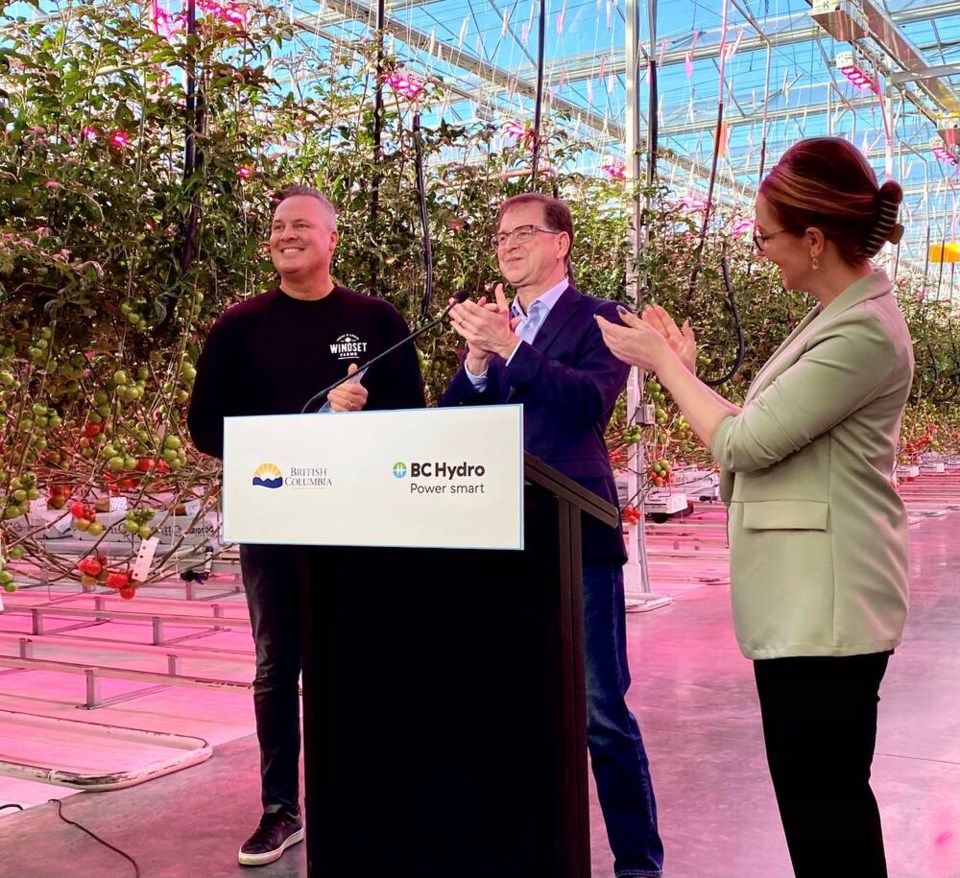Buying B.C. and expanding capacity will ensure needed support for the provincial economy for the short and long run as American President Donald Trump’s tariff threats loom over Canada.
That was the message from Adrian Dix, B.C. Minister of Energy and Climate Solutions, at an event Friday at the huge Windset Farms greenhouses in Ladner to celebrate the operation’s clean energy partnership with BC Hydro, which saw the vegetable grower undertake extensive upgrades designed to maximize efficiency and sustainability.
Dix, who along with Diana Stephenson, BC Hydro’s Senior Vice-President of Customer and Corporate Affairs presented Windset Farms President and CEO Steven Newell with Clean Energy Champion award, said clean, affordable electricity is a tremendous advantage for B.C., helping ensure that the products produced are low carbon, making them more competitive domestically and internationally.
Asked about potential impacts to the provincial economy and food security if Trump follows through on devastating tariffs, Dix provided a lengthy response including the importance of buying BC products and supporting local producers.
“The extent you can here in B.C. is by supporting B.C. farmers everywhere, and this isn’t the first challenge we faced….Even without the issue of tariffs, the issue of food security in B.C. is a fundamental question, and that means supporting B.C. farmers everywhere we can. These products that are developed here are part of a partnership, obviously, with BC Hydro to help make that happen. So, what you see here is an important part of the response…” he said.
Dix noted it was important to learn from the experiences of COVID-19 including the need to develop domestic capacity, as other challenges in addition to tariffs may come in the future.
“There’s lots of things we can say about this trade issue and the premiers and the prime minister and others who are dealing with that at the highest level, but, fundamentally, we will only be prepared for this if we support businesses like Windset Farms and the self-sufficiency that requires.
“B.C. agriculture is a little different, we don’t have often single big crops some jurisdictions have, but it’s critical to our province. We have to develop on the production side, farming side, processing side. We’ve got to build B.C. businesses, because every time we do that, one small step at a time we’re better able to sustain the challenges of climate change, which we’re seeing now everywhere in the world and affects our agricultural economy, and affects California’s economy…I think when people see this, and they see the products in the stores, it’s absolutely worth supporting by buying B.C. and buying locally,” added Dix.
With support from BC Hydro, Windset Farms has upgraded its new and existing greenhouses to a higher-powered transmission system. BC Hydro says adding the new state-of-the-art systems ensure a reliable, year-round supply of vegetables to major grocery chains.
“There’s a real push from retailers and consumers to have locally grown produce and to make that possible, it all came down to the availability of power,” said Newell. “Knowing we’ve got the electricity we need gives us and our retail partners certainty of assured locally grown, B.C. supply, year-round.”
BC Hydro notes it also provided $4.8 million in LED lighting incentives, allowing a complete switch from energy-intensive high-pressure sodium lighting to energy-saving LEDs. The upgrade means the Delta greenhouses now boast 48 acres of lit production, making it the largest lit greenhouse vegetable facility in western North America, and reducing electricity consumption by about 55 percent.




